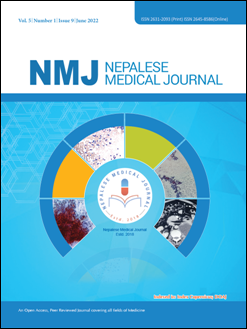Oral Gabapentin Pretreatment to Attenuate the Haemodynamic Response to Laryngoscopy and Tracheal Intubation
DOI:
https://doi.org/10.3126/nmj.v5i1.45703Keywords:
Blood pressure, Gabapentin, Heart rate, Intubation, LaryngoscopyAbstract
Introduction: Laryngoscopy and intubation are associated with transient sympathetic responses manifesting as a rise in blood pressure and heart rate. This study was conducted to evaluate the role of oral gabapentin pretreatment in the attenuation of such haemodynamic response.
Materials and Methods: Sixty-two patients aged 16 to 60 years weighing 50 to 75 kg undergoing elective surgeries requiring endotracheal intubation were randomized into two groups. group G received 900 mg oral gabapentin and group P received a placebo by mouth two hours before induction of anaesthesia. Patients were induced with propofol, fentanyl, and vecuronium. Laryngoscopy was attempted after four minutes and endotracheal intubation was done. Heart rate, systolic, diastolic, and mean arterial pressure at baseline, before intubation, one, three, five, and ten minutes after intubation were compared between two groups. Patients were observed for any adverse events peri-operatively and post-operatively for the first 24 hours.
Results: There was significant attenuation of the rise in blood pressure and heart rate before and after intubation in both groups compared with their corresponding baseline parameters. A significant decrease in heart rate was observed in the gabapentin group only 10 minutes after laryngoscopy and intubation (p=0.022).
Conclusions: Oral Gabapentin 900 mg two hours before induction is effective in attenuating the rise in blood pressure and heart rate following laryngoscopy and tracheal intubation, though a statistically significant difference was observed only at 10 minutes after intubation, compared with a placebo group. Besides the significant incidence of pre-induction somnolence, there were no serious perioperative adverse effects.
Downloads
Downloads
Published
How to Cite
Issue
Section
License
Copyright (c) 2022 Dr. Tulsi Ram Shrestha, Dr. Srijana Podar, Dr. Suson Ghimire, Dr. Dhiraj Tamrakar

This work is licensed under a Creative Commons Attribution 4.0 International License.
This license enables reusers to distribute, remix, adapt, and build upon the material in any medium or format, so long as attribution is given to the creator. The license allows for commercial use.
Copyright on any article published by Nepalese Medical Journal is retained by the author(s).
Authors grant Nepalese Medical Journal a license to publish the article and identify itself as the original publisher.
Authors also grant any third party the right to use the article freely as long as its integrity is maintained and its original authors, citation details and publisher are identified.




